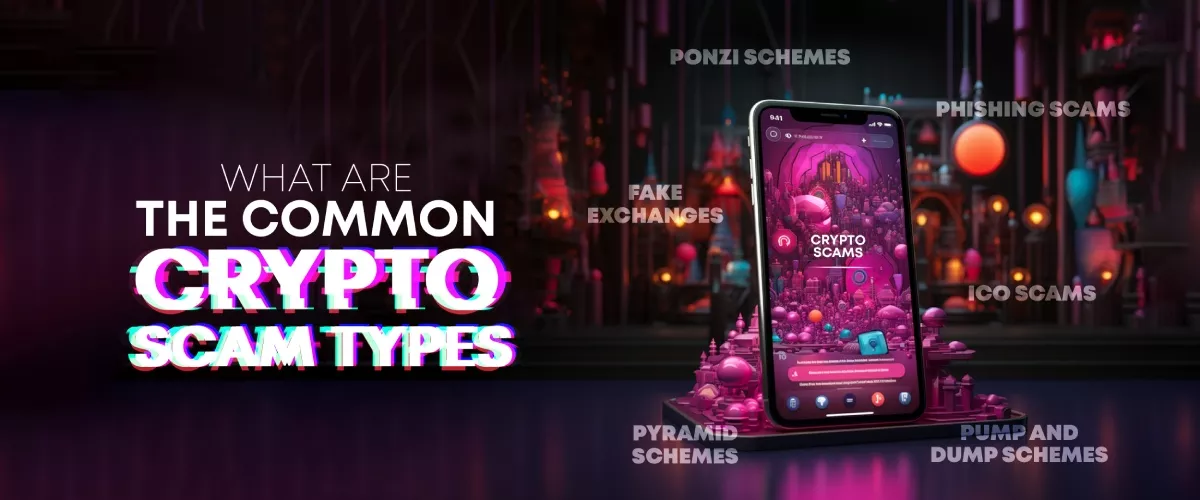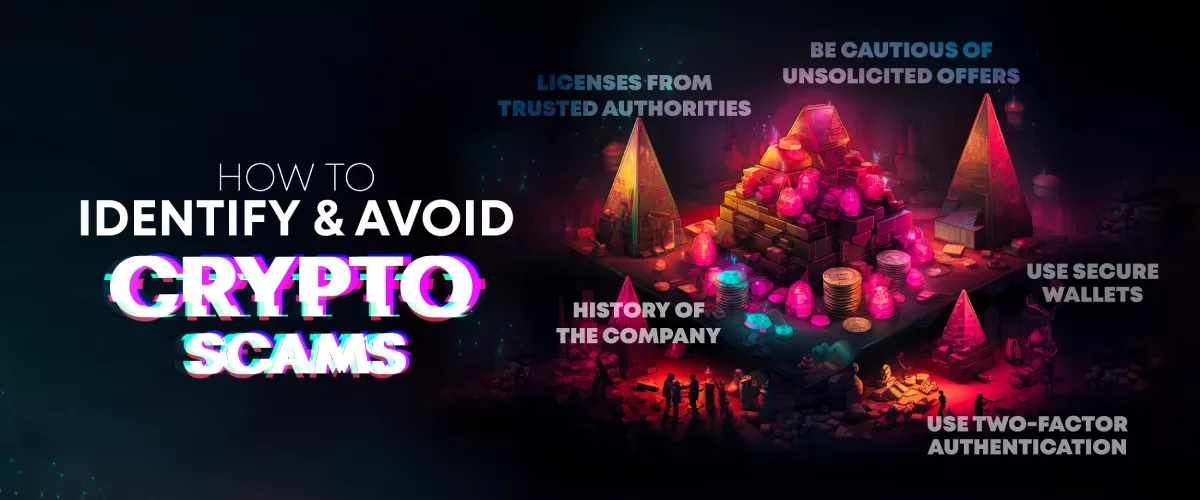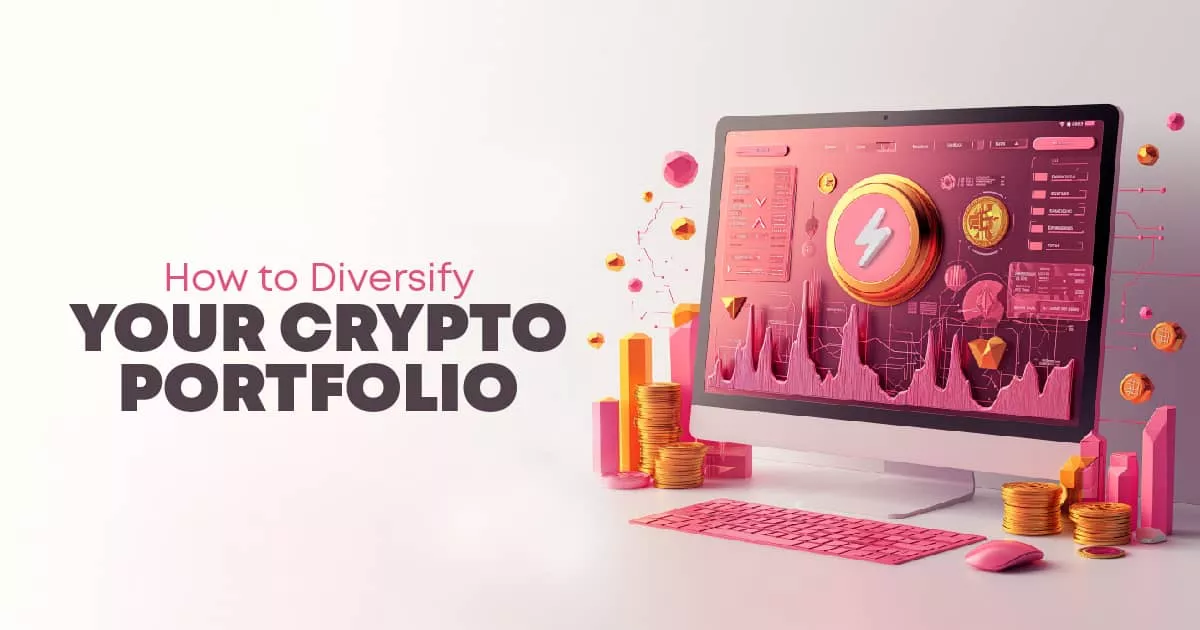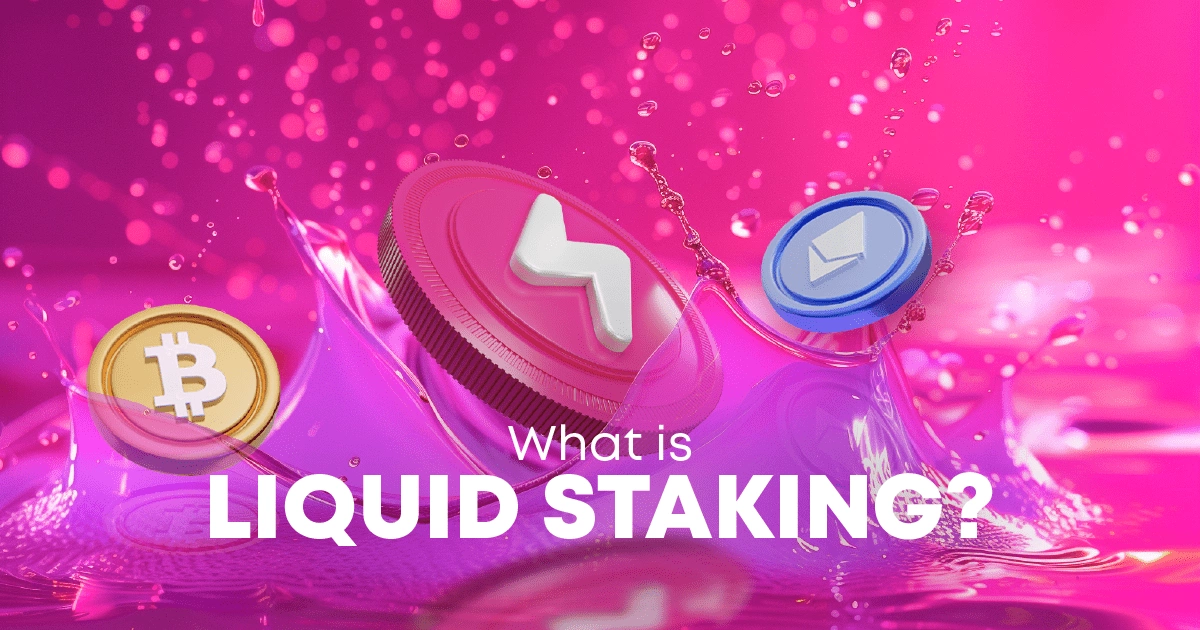On This Page
- What is a crypto scammer
- How do crypto scams work
- Common trends of crypto scams
- What are the common crypto scam types
- How to identify and avoid crypto scams
- Be cautious of unsolicited offers
- Use secure wallets
- Licenses/certifications from trusted authorities
- History of the board of directors
- History of the company
- Potential use, liquidity and usage of the token/project
- The vision of the token
- Backed by who?
- Who's involved in the project
- Don't unnecessarily share personal information
- Avoid unfamiliar websites
- Use two-factor authentication
- Conclusion

Crypto Scams: How to Identify and Avoid Them
The interest in the crypto market has been increasing in recent years, and with a whole package of attractive features, crypto continues being the main thing for scammers. The FTC (Federal Trade Commission) reports around $1 billion loss in crypto between Jan 1, 2021 and March 31, 2022, and this number may only be the tip of the iceberg.
Cryptocurrencies are mostly not authorized by any centralized authority and hence they become more vulnerable to fraud and attacks of crypto scams. Most people in crypto don’t even know how the system works and that the crypto transfers can not be reversed as they run on blockchain. This article is to help people understand tips on what crypto scams are and how to identify them to avoid possible attacks.
What is a crypto scammer
To be able to spot crypto scammers, you must learn who they are.
Just like everywhere else, scam artists know no boundaries and this also applies to cryptocurrencies, where chances to track your money once it's sent go down to almost zero. The most important thing to know is that scammers can go to any lengths to get your money, and to avoid becoming a victim of their manipulation, it’s better to get the hang of how you can suspect the scammer or any crypto-related operation.
How do crypto scams work
The main reasons scammers or thieves get attracted to cryptocurrency can vary from the chance of being pseudonymous to the lack of authorized power or legal protection and transactions that can almost never be reversed. These scam artists can come for your money in ways no one can be suspicious about, like tricking a naive person into sharing private information or sending cryptocurrency to a suspicious unknown wallet.
Crypto scams often aim to win trust and fidelity through many giveaways, initial coin offerings (ICO), NFT (non-fungible token) drops and even attempts to build fake romantic relationships to develop further scenarios for their scam.
Common trends of crypto scams
Cryptocurrency scam scenarios are mostly traditional theft ways that sometimes just come with new tools. Compared to 2021, we have seen an increase in crypto scams that make around 10% higher in 2022. Every year most of the crypto scams or attacks are reported from exchange platforms, blockchain bridges, as well as from DeFi protocols that are simply aimed to govern how crypto assets are used in blockchain.
Most people lose to rugpulls, meaning that the project owners stole liquidity from the investors by closing the project without a trace. Here are some obvious examples of what can alarm you to suspect cone artists or projects.
Promises of high returns
Success stories of crypto millionaires about their high investments in crypto and other crypto-related industries can in fact attract many investors who want to try their luck in crypto and enjoy the fruits of their invested money. It is said that everyone who bets big, can eventually lose big and this kind of stories have already started to pop out and they will continue this year too.
One of the most obvious alarms of crypto scam scenarios are the promises to earn high returns with the risks going down to zero. You must always take into account that no one can promise you an investment free of risks, so do your homework and educate yourself in crypto before falling for it. Remember that information and attention can become the best defense against crypto scams/ frauds.
Requiring you to send money
Here is another possible scenario of a crypto scam. Lots of cone artists will cheat you into sending them some money or cryptocurrency in order to “help” you invest. You should be really cautious of these kinds of offers, as most of the advice or helping attempts are possible scams.
Anything that captivates or inspires a person falls into the strategy of scammers. In this case, they can use the trick of emotional persuasion. Scammers mostly guarantee you big payouts and loads of money, thus awakening the emotional decision-making side of you as a buyer to reach their goal. Stay alert to recognize emotional abusers that come after your money because once you send them crypto or any kind of money, it will be gone forever.
Impersonating a legitimate company of individual
Scammers pretend to be someone trustworthy to persuade you into buying and sending them cryptocurrencies. They can impersonate well-known companies or trusted individuals, government agencies or pretend to be a celebrity able to multiply your income with a certain cryptocurrency.
In the name of well-known companies, they can send you ads, emails or text messages, encourage you to give them your account details or send them crypto, as the account happens to be at risk or has already been attacked. They come in waves, so as soon as you answer their calls, click the links or open the photos, you get in touch with a scammer.
Offering side income without any risks
Crypto scammers attract people with “get rich real quick” or “no risks in investing crypto” type of messages, promising lucrative and guaranteed returns with no risks at all. This can actually be very tricky, and unfortunately, many people fall for the idea of enriching their finances in days, instead of working for it for months and even years. And this perfect strategy works best for fraud scenarios.
When considering making any kind of investment, especially in cryptocurrencies, always find out the risks, interrogate as much as you can about where the money will be directed to, or what are the odds of losing your money. Honest advisors or legitimate companies share all the ups and downs of your deal and provide every detail that matters.
Not having legitimate KYC processes
When registering on a cryptocurrency exchange platform, ID verification and KYC checks are mandatory and serve as a legal requirement. KYC (know your customer) is simply an identity verification process that each financial institution or organization carries out to provide maximum protection both for their product and for their customers as this sphere tends to attract frauds, cone artists and scammers.
As secure as it is, many exchange platforms still do not require proper KYC checks, and this leaves us to doubt their authenticity and question the legal integrity. Accepting the risk of trading crypto on no KYC exchanges, can cost you your whole money or business, becoming a victim of fraud. Try to avoid them and secure yourself for the future.
What are the common crypto scam types

Cryptocurrency scams come in many waves and take multiple forms. And here are several common types to watch out for in 2023.
- Ponzi schemes
- Phishing scams
- Pump and dump schemes
- ICO scams
- Pyramid schemes
- Fake exchanges
Ponzi schemes
As probably one of the most wide-spread crypto scam types, Ponzi schemes come as investment scams involving the payment of purported returns of existing investors from funds contributed by new investors.
Ponzi scheme organizers usually use the latest industries, technologies or innovative projects to lure fresh investors into cryptocurrencies. New projects attract investors with the unexpected opportunities they can bring with them and this is where they start underestimating the risks.
Cryptocurrencies are the latest “fresh meat” for scam artists, with their greater privacy benefits in terms of transactions, allowing them to offer investors high returns and little risks as the growing Internet phenomenon.
Most of the Ponzi scheme cases share similar characteristics such as overly consistent returns, sellers without licenses, unregistered investments and last but not least unlimited returns that take little or no risk at all.
Every “fresh” investor must be highly skeptical of each paperwork about the prospects of their investment. Risks are always out there, especially with cryptocurrencies, so you better watch out before giving your money away with no guarantees of return.
Phishing schemes
Phishing scams have been around for a while, but scammers still won’t give it up as they have now adopted it to crypto. In case of phishing schemes, attackers target consumers with emails containing malicious links to “great” websites with booming investment offers that you cannot miss.
Via these websites, scammers can get your personal details, such as private information about your cryptocurrency wallet address. Once this key information is stolen, your wallet is gone as the key is unique for each wallet, meaning that the person needs to create a completely new wallet.
To avoid phishing schemes, it is best to check the websites directly, however secure or familiar it may look or seem.
Pump and dump schemes
Present in the economic contexts from around the 1700s, pump and dump schemes have evolved to become more prevalent now. Manipulation is the main asset here, that’s why these schemes target mainly micro- and small-cap stocks.
Pump and dump schemes are practically the amassment of a certain commodity (in this case cryptocurrencies) over time by fraudsters who artificially increase its price with misinformation, known as “pumping”, later selling their assets to rather unaware investors/buyers with a higher price, also known as “dumping”.
Before getting into a pump-and-dump deal, you better find out its legal grounds. However crypto and exchange platforms are still considered a “safer” place for scammers that lack lots of regulations unlike the stock market.
After spreading the word that a certain cryptocurrency is rising, scammers aim to attract people with the FOMO (Fear of Missing Out) of one-of-a-kind chance to use multiple social media platforms for it.
As uncertain as the signs of pump-and-dump frauds can be, you can however consider every hype around a new-rising currency a red flag. Dive deep into each motivation people can have to involve in its promotion and discuss every detail before you go for an unknown project.
ICO scams
New cryptocurrency, new initial coin offerings (ICOs). The birth of new cryptocurrencies always whets the appetite of investors, but entices scammers at the same time. To remain safe from false ICOs, you can look out for some ways to somehow guarantee yourself from falling for a scam.
- The offer usually looks fishy when it really is. If you still have doubts after a thorough examination of the project, including its website, links or whitepaper, then you had better save your time and stay away from it.
- Understand the project 100%. Don’t let words like new technologies, revolutionary, blockchain or AI confuse and deceit you. Find the necessary information for you among these fancy words.
- Root for the Token sale details. If the company makes it harder for you to chart ICO progress, it can be a major alert for you to be attentive.
- Do your homework about the team. The best you can do is to thoroughly research the team of the project and after they gain your trust, you can consider investing.
Pyramid schemes
Pyramid schemes share multiple similarities with Ponzi schemes, however they are not identical. A typical pyramid scheme offers its investors the opportunity to make a lot of money by engaging new members and recruiting them into the fraudulent project.
Very often pyramid schemes appear to be a legitimate marketing practice, but it involves very little legitimate sales paying investors from the incoming funds of the new members rather than true profits. Scammers can invite you to buy crypto and as the cryptocurrency price goes up, they make more profit.
So it is all for the best to stay away from fruitful offers that look like sophisticated opportunities.
Fake exchanges
Cryptocurrency exchanges are the most important platform to buy, sell or trade crypto. Fake and unregulated platforms are potential red flags that position themselves as legal ones to attract users.
To promote these fake platforms, scammers pay celebrities to present it on social media promising extraordinary returns and high payouts without risks. They can even use violence to have you invest more and make lots of obstacles in the name of fees if you try to withdraw your investment.
To identify potential fake exchanges, it is important to research their history, take into consideration what they offer and what unusual registration or withdrawal fees there are.
How to identify and avoid crypto scams

There are several practices to spot and avoid cryptocurrency scams. Whenever considering a cryptocurrency investment, learn all the ups and downs and find out how you can protect your assets and yourself.
Be cautious of unsolicited offers
Pay attention to any offer about crypto investment opportunities that you don’t know the source of and moreover never ask for it. Unsolicited communications are one of the biggest red flags in crypto scam cases, where fraudsters contact you through phone calls or emails offering great deals that you shouldn’t miss.
Use secure wallets
In the crypto infrastructure, the security of wallets is a complex topic, as the security of the crypto wallet equals the security of all the assets it holds. To not result in the loss of your crypto funds, pay attention to what you install on your computer or digital device and keep it away from connecting to your crypto wallets.
Use wallets that provide ultimate security for your crypto holdings and can offer additional backup methods in case of scam attacks.
Licenses/certifications from trusted authorities
Crypto licenses give companies or projects the right to trade, buy or sell cryptocurrencies and other digital assets which allows them to create crypto exchange platforms and offer trading services to investors.
To obtain a license or certificate for their project, companies need to meet every criteria and requirement set by a certain financial regulator. This includes providing adequate capital management procedures, technical competence in terms of handling digital assets and meeting every regulation of anti money laundering procedures.
Long story short, crypto licenses provide legal safety for both the company and investors making sure to protect users’ data and assets.
History of the board of directors
The board of directors is ultimately responsible for the security and integrity of the cryptocurrency, and if the company trusts them to become members of the board, they simply put the faith of the company in their hands.
Thoroughly examine each member of the board, go back to their history and find out if they have any dark stages in their career. In case of any obscure information that leaves doubts, you may reconsider your investment choice.
History of the company
Place the security of your information and crypto assets first and trust only reputable companies. There are many scammers who impersonate successful organizations and attract customers with hot offers. To save yourself from a lot of troubles, it is best to examine the team that stands behind the project, search for company reviews on Google and pay a great deal of attention to their roadmap.
Check out their social media activity and find the profiles of the members on Linkedin or other platforms to add confidence that you trust the right people with your money.
Any dubious gaps in their history or miscommunication can actually signify a serious alert.
Potential use, liquidity and usage of the token/project
Crypto is currently a trendy and exciting asset which can be very speculative at the same time. More than that, your investment can be totally unnecessary if you are uneducated about it.
Crypto liquidity mining, as complex as it can be, is a perfect spot for crypto crimes. Try to be attentive and not fall for liquidity pools that never existed and see all your investment disappear. Fraudulent tokens or Ponzi schemes are rather frequent where there are no regulations.
The vision of the token
Having a clear vision about the company or the cryptocurrency helps them stand out in terms of setting certain goals to accomplish. The vision of the token should solve several issues at the same time.
First of all, it helps the possible future investors have a better understanding and enough details about the project and what solutions it offers them. Clear definitions and exact articulation of the idea for the vision are essential and they must have the ability to prove that the company really stands for its vision and can accomplish it with them.
Most cryptocurrencies nowadays communicate the future and all the solutions that crypto offers to make it better and exceptional. However, not every currency is capable of taking that vision till the end. Blurred descriptions of the vision may really become the alerting point for investors to look out for.
Backed by who?
Nowadays, a strong and supportive community is what builds a successful cryptocurrency project. The activity of a certain community defines whether the project has a future and can grow or it is just pure emotional excitement and hype of the moment.
What resonates the reliability of a crypto project more than the community, is who stands behind the project and puts every effort to make it succeed. Looking back to its roots gives a very good insight into the company. For instance, Fastex is backed up by a successful and giant IT company - SoftConstruct, that has a giant network of millions of users and has come a long way in the industry.
To sum it up, the perfect tip for having a reliable source about the cryptocurrency is the company or the person who promotes it.
Who's involved in the project
Successful and legitimate cryptocurrency projects mostly have a strong army of leaders that execute and keep their hand on the project’s pulse all the time. Besides the executive team, there are also the developers and architects that make the backbone.
The team involved in the project can help you define whether the project is worth investing in or not. A great way to research them is to look into their Linkedin profiles, follow their social media activity and learn about their career path.
It’s not excluded that a project can be anonymous and still enjoy its moment of success, like Bitcoin or Verge and Beam. Nonetheless, there are many who appear to be frauds, so a little research of the team will be no harm for your investment.
Don't unnecessarily share personal information
Always keep your financial information private, no matter how trusted the platform or company seems. You must be the only person to know the access details to your financial accounts.
Avoid unfamiliar websites
If you definitely decided to invest in cryptocurrencies, the very least you can do is to secure yourself by carefully examining every platform and asset. The same refers to the websites that are connected to platforms and applications that you use for crypto.
Do they clearly pass the necessary information you need to make that decision? How high does it rank on Google? Who built the website or who are the team members? In the sea of millions of lookalike apps and websites, it is easy to get fooled by scammers. Make sure you go for the website that has a good reputation and is not completely unfamiliar to you.
Use two-factor authentication
Multi-layered security measures work for your favor to provide ultimate security from any kind of fraudulent attacks by scammers.
Two-factor authentication can ensure your safety and will not allow even hackers to get your private information or credentials, and even if they do, the system will never allow them to hijack your wallet or crypto trading account.
In case of attacking your account, you will be sent a code to verify your attempt to access. Receiving a code out of blue will signify a red flag that something is not right in your account and you can take necessary preventive measures for it.
How to report cryptocurrency scams
If you think you have been targeted by scam artists or have already fallen into a scam scenario by a fake exchange or by other above mentioned schemes, you should immediately report local authorities, your bank, your crypto exchange platform.
It is safe to know that the money you lose through crypto transactions is hard, and sometimes even impossible to recover, depending on various circumstances. The main reason for that is the impossibility to trace crypto transactions once they happen on decentralized platforms.
Here are certain steps to take once you are in such a situation to target scammers or limit the damage.
Contact the authorities
Several organizations exist to help you to deal with cryptocurrency scams. Among these organizations are your local authorities. You can go there to report about fraudulent activities and share information about your case.
Any piece of information can be helpful, including the phone number they contacted you with, or the website or platform you registered by their exhortation. You may even describe their physical appearance or help to locate them in case you have previously had any direct contact with them.
Reporting a cybercrime like crypto scam attacks can be a big help for your authorities to go further with their investigation.
Report the scam to the relevant regulatory authorities
Cryptocurrency regulations and the authorities responsible for them may vary around the world, as the number of people interested in cryptocurrencies continues to increase. If you are a victim of crypto fraud, you have to immediately file a complaint and turn to your local authorities responsible for crypto regulations.
Gather evidence
In order to proceed with your scam report, prepare to prove your ownership and provide as many details about the case as possible. You must have proof that the stolen or hijacked sources of funds belong to you, as it is required by law enforcement.
Keep your accounts and their access details with you as you may be required to transfer a few tokens to your wallet to prove its authenticity and ownership. Every hint of doubt you might have felt during the transaction process should be carefully described in your report.
Alert your bank or credit card company
Report scams to your financial authorities if you have any card attached to your wallet to help you stop losing any more money. Bank or credit card companies have to know if your financial information is being compromised and they will help you block accounts for further money loss.
As devastating as becoming a scam victim can be, you should keep your head cool and start taking immediate actions. It is important to notice that your money may not come back, but with this you are helping other people not become possible victims of such scenarios.
Reach out to the platform or exchange you used
As soon as you recognize the warning signs of fraud, actions should be taken immediately. It is accepted that by registering on a certain crypto exchange platform, you give them access to some sort of confidential information. This makes both you and the other party/organization the responsibility to take care of your information.
It is somehow the platform’s duty, so far as it is reasonably applicable, the safety of your holdings. Contact them as soon as possible in case of emergency, report the details of fraud and every unusual change or activity that you have seen on your account leading you to believe you are being a victim of a crypto scam.
Share your experience
As they say, “Sharing is caring”. Becoming a victim of crypto scams or spotting them may be too late in your case, but it is definitely a big deal of help for further investigations and fraud research.
Hearing about a scam scenario from the people you know or just reading it online also pushes this process forward, as people hear the story and pay attention when it comes to their own crypto experience.
Social awareness is one of the strongest tools to help authorities identify cone artists before they target others. So make sure your story does not remain untold and share as many details as possible.
Conclusion
What we can conclude from all the information above, no one is forever secured from being attacked by scammers, especially in the crypto industry where there are millions of scenarios, and most of the time the scammers’ identity is untraceable and leaves no grounds to recover the lost money.
Cryptocurrencies are not insured by federal law. It means that keeping your information private and secure by all means is crucial. This article can guide you to learn a few tips on how to avoid cryptocurrency scams and how to report them.
Remember that crypto scam artists always develop new ways to approach your finances, and self education and awareness are the best weapons to face them.
Disclaimer: Includes third-party opinions. No financial advice.



